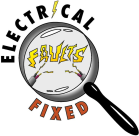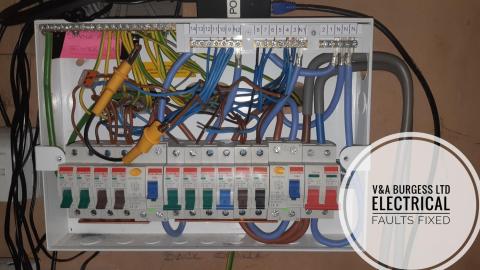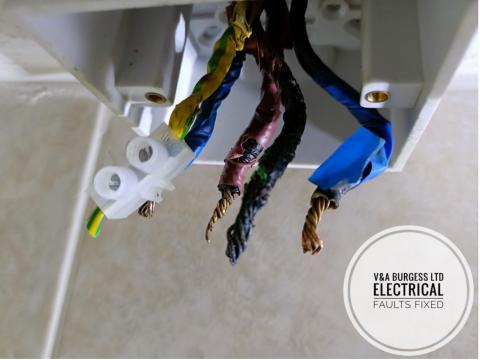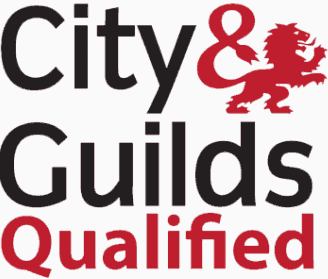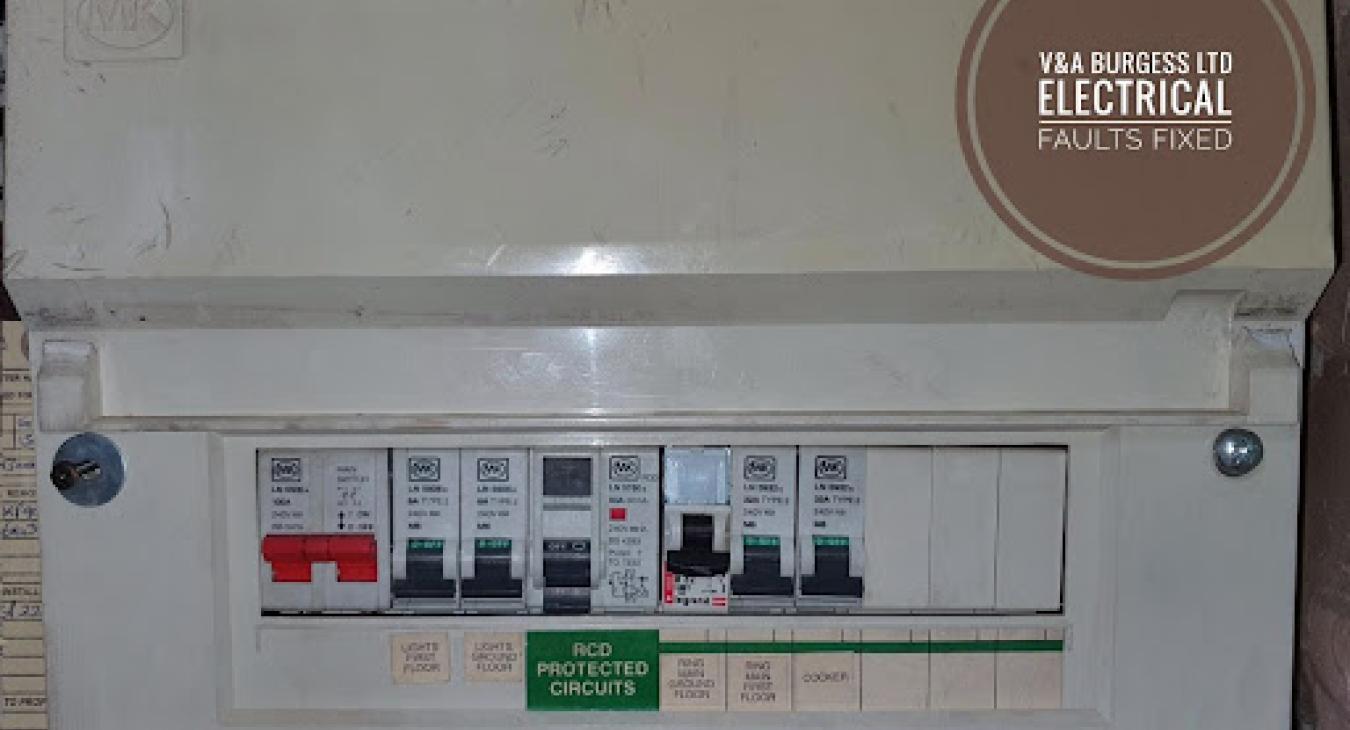
Table of Contents
- What can I do to make my home electrics safe?💭
- Extension leads🔥
- Cords of appliances🔌
- Heat producing kitchen appliances🧯
- How do I know if my home electrics are safe?🤔
- Is DIY electrical work safe?🤷
- So, how do we ensure that we carry out work safely in accordance with the regulations? 👨🔧
- Yes, but what electrical work can I do myself?💭
- Is an extension lead to the shed safe?🌳
1) What can I do to make my home electrics safe?💭
There are several electrical hazards that can be present in our homes. The risk of shock, fire and burns can occur when electrical systems and appliances are improperly used or maintained and as such it is a good idea to try and minimise these risks.
Back to top2) Extension leads🔥
Extension leads are very convenient especially when there are not enough sockets in the room for all the appliances or electrical items that you may wish to plug in. Great care, however, should be taken to avoid overloading an extension lead as it is easy to do! When overloading an extension lead the fuse should blow right? Wrong, in many cases, the 13-amp fuse that tends to be present in most extension leads will not blow at 13 amps. It will not even blow at 16 amps, in fact, it will allow 20 amps to pass ALL DAY LONG without ever blowing.
The trouble with this is, the fuse gets very, very hot and will begin to melt the plastic surround of the plug giving serious risk of electrical fire! If you are unsure of the amount or type of electrical equipment that can be plugged in and used on an extension lead then check out our web page which links to Electrical Safety First, a fun interactive overload calculator to help you figure out what is and is not safe.
3) Cords of appliances🔌
Appliances and their cords, including the cords of extension leads can become a trip hazard when run without care. Long appliance cords and extension lead cords can also become trapped in doors and squashed under foot leading to pinching and damaged cables.
Cable damage can occur from impact to a cable, even if there is no visible damage to the outside of the cable. The insulation on the copper wiring inside the cable can become cracked and damaged through impact or pinching and result in a cable that trips the electrical box / consumer unit in your home every time it is used or intermittently.
Back to top4) Heat producing kitchen appliances🧯
In our kitchens we have a large number of heat producing appliances and these present great risk of fire if not used correctly. Placing toasters or hot plates underneath kitchen cupboards is a danger and, when in use, these appliances should be slid forward such that the heat from them does not become trapped under the cupboards.
Electrical cords should be routed away from cooking surfaces and hot equipment to prevent danger.
5) How do I know if my home electrics are safe?🤔
The simple answer is, you don't!
It is very difficult, in most cases, for even a professional to establish the safety and condition of home electrics by simply looking at them. There are of course, exceptions. If sockets are hanging off the wall and the electrics are clearly ancient then most people would be able to say that there were safety concerns with the system.
The absolute best way of finding out if the electrics in your home are safe is to have them checked by a professional to find out the condition, if there are any hidden defects and safety concerns. This is a check that takes several hours and goes into great depth including electrical testing with specialised equipment. The report produced as a result of this is around 6 to 8 pages and contains valuable information for you on the condition of your home electrical system.
For more information about electrical safety checks, have a look at our webpage regarding these. We have taken the time to write lots of information and produce videos for you, our customers about this topic and we hope that it is helpful to you.
https://www.electricalfaultsfixed.co.uk/electrical-safety-checks-eicr
Back to top6) Is DIY electrical work safe?🤷
There are certain electrical tasks that can be safely undertaken by a DIY enthusiast in the home. Everyone’s abilities are different and as such, this is a difficult question to answer. Electrical wiring and electrical work must be carried out in accordance with BS7671 wiring regulations, failure to do so is likely to be a breach of EAWR1989 regulations which could result in falling foul of the law. Any work not compliant with BS7671 and causing harm, injury or worse would be difficult to explain in front of a judge! ☹
Back to top7) So, how do we ensure that we carry out work safely in accordance with the regulations? 👨🔧
Firstly, it helps to have a copy of BS7671, currently around £100.
Secondly, when we carry out ANY electrical work, electrical testing is required. This does not mean simply turning the light or socket on and checking it ‘works. No, electrical testing requires carrying out some safety tests in accordance with the wiring regulations. Guidance Note 3 from the IET (currently £40) gives detail on the testing that should be carried out before, during and following electrical works along with the correct certification that should be issued. Thirdly, the test equipment required to carry out the testing is likely to cost, as a minimum, around £6-700. Very quickly, the knowledge, tools and experience begin to stack up when carrying out electrical work.
Back to top8) Yes, but what electrical work can I do myself?💭
Changing a plug top can be carried out by nearly everyone with a few tools and some advice from the internet.
You may be able to swap a socket front, like for like for another. The requirement for electrical testing still applies along with, arguably, a minor works certificate though so you may wish to consult an electrician to carry out some testing to ensure earth continuity and circuit continuity. Earth continuity is the process whereby the electrician ensure that the earthing is continuous from the point of power utilisation back to the consumer unit and beyond. This is vital to the safe operation of electrical systems in the home. 😊
Swapping a broken plastic pendant for another, like for like, can often be carried out also. Installing a replacement light fitting can often warrant the need for an electrician as many modern light fittings are now confusing to install, come with vague electrical instructions and require special tools to fit. Things can become more time consuming and therefore expensive if you have damaged the wiring or light fitting prior to calling an electrician so consider if it may be best to employ one for your project in the first instance. Resetting a circuit breaker can be safely done yourself, if the circuit breaker trips more than once though, this means that there is an electrical problem in your home and may require an electrician to come and investigate for you. Have a look at our help sheet if you are having issues with tripping circuit breakers. https://www.electricalfaultsfixed.co.uk/helpsheet/help-my-house-electrics-are-tripping
Replacing a lamp (bulb) in a light fitting. This is often a straightforward job for most light fittings although some can prove difficult to access and require tools or a ‘special touch’ from someone in the know. If you are having issues, give us a call and we may be able to help over internet video call 😊because, well, we are nice like that.
Rewiring a fuse in an old fuse box. This is a fiddly yet, straightforward task. Made more difficult the larger one’s hands are! ☹ If you have the correct fuse wire then this can often be carried out safely as a DIY task. The issue arises when you are not sure if you have the right wire, the wire installed previously was incorrect or there are further problems causing the wire to continually blow. If you find that the wire blows more than once then you have an electrical problem in your home and this needs to be investigated before damage occurs. Using a larger wire is seriously dangerous and may result in electrical fire. The fuse wire is there to protect your electrical cables in the home and without the correct size of fuse wire, the electrical cables may overheat and catch fire before the fuse wire blows!
9) Is an extension lead to the shed safe?🌳
In nearly all cases, NO. Extension leads are not meant to provide permanent power to anywhere and are only to be used as a temporary measure to power equipment. Their use must be in accordance with the manufacturer’s instructions and common sense.
We see many burnt out extensions leads, leads put into plastic bags in an attempt to make them waterproof and overloaded leads.
Shed electrical installations should be carried out by a professional only and in accordance with all building and wiring regulations. Yes, we know it is boring, yes, we know it costs money but safety is paramount and electric shock and fire prevention are critical.
It is best to get quotes for this kind of work and to have a trusted electrician carry out the work for you rather than get things done cheap and quick. Sometimes it may be necessary to save up for the right job and have it done properly. If you want no obligation advice on a supply to a shed then please get in touch and we will happily give you a ballpark estimate based on some information or a quote based on a site visit.
9.1) Question?
📧 Contact us
Back to top